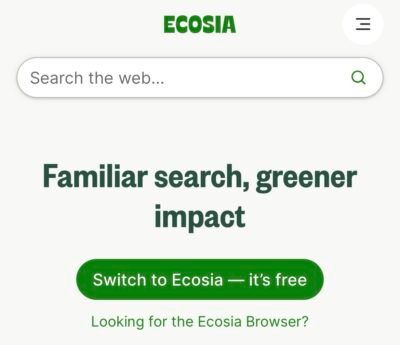
Try Ecosia Search Engine
In an age where climate change and environmental conservation are urgent global issues, the choices we make in our daily lives—down to the apps and services we use—can have a significant impact on the planet. Enter Ecosia.org, an eco-friendly search engine that’s rapidly gaining popularity for its promise to plant trees with every search. But how does it compare to other search engines like Google, Bing, or DuckDuckGo? Let’s dive into what makes Ecosia unique, how it works, and how it stacks up against its competitors.
What is Ecosia.org?
Ecosia is a search engine that uses its ad revenue to fund tree planting initiatives around the world. Launched in 2009 by Christian Kroll, Ecosia’s mission is to provide an eco-friendly alternative to traditional search engines. Its most unique feature is its promise to plant trees from the profits generated through search queries. With more than 150 million trees planted so far, Ecosia has gained a dedicated following of eco-conscious users looking for a way to contribute to environmental causes with minimal effort.
Unlike other search engines, Ecosia reports monthly on the trees they’ve funded and the projects they support. The company claims to be fully transparent with their finances and provides proof of how their revenue is used. In addition, Ecosia runs on 100% renewable energy, making it a sustainable choice from both a financial and environmental perspective.
How Does Ecosia Work?
Ecosia operates like most other search engines, using Bing’s search results for its queries. However, unlike Bing or Google, Ecosia adds an extra layer of commitment to the environment by donating at least 80% of its profits from search ads toward tree-planting projects worldwide.
It may take a few more searches to fund the planting of a tree compared to a larger search engine like Google, but Ecosia’s model prioritizes sustainability over profit. The search engine aims to create positive environmental impacts while still offering a practical and user-friendly service.
Comparing Ecosia with Google, Bing, and DuckDuckGo
To understand the advantages of Ecosia, let’s take a look at how it stacks up against its competitors in several key areas: search results, privacy, and sustainability.
1. Search Results
- Google: Google is the undisputed leader in search engine quality. Its sophisticated algorithms provide the most relevant, accurate, and fast results, often including featured snippets, direct answers, and a variety of rich media like images, videos, and news.
- Bing: While Bing is owned by Microsoft and offers competitive search results, it is often seen as slightly less accurate than Google, especially for niche or complex searches. However, Bing does provide a robust and competitive experience, especially in its integration with Microsoft products.
- DuckDuckGo: Known for its focus on privacy, DuckDuckGo also delivers decent search results powered by a combination of partners like Bing and its own crawler. However, DuckDuckGo doesn’t offer the same level of accuracy or comprehensiveness as Google.
- Ecosia: Ecosia’s results are powered by Bing’s search algorithm, so in terms of search result accuracy and relevance, it’s comparable to Bing. However, since Ecosia focuses more on sustainability, it’s less of a “powerhouse” in terms of personalized search results. Still, for most users, it provides a satisfactory search experience.
2. Privacy
- Google: Google is notorious for its data collection practices. While it offers excellent services and products, it tracks nearly everything users do across the web, often using this information for targeted advertising.
- Bing: Similar to Google, Bing collects data from its users and uses it for personalized advertising and other services.
- DuckDuckGo: Privacy is DuckDuckGo’s key selling point. It doesn’t track or store user information and offers a truly anonymous browsing experience.
- Ecosia: Like DuckDuckGo, Ecosia prioritizes user privacy. It doesn’t track personal information or sell it to third parties. Ecosia’s privacy policy ensures that search data is anonymized within a week, offering a decent level of privacy protection for users.
3. Sustainability and Social Responsibility
- Google: Google has made strides toward sustainability, including running its data centers on renewable energy and working to offset its carbon emissions. However, Google still focuses largely on profit generation, with environmental and social responsibility as secondary priorities.
- Bing: While Microsoft, Bing’s parent company, has committed to becoming carbon negative by 2030, Bing does not have a direct environmental initiative like Ecosia’s tree planting program.
- DuckDuckGo: DuckDuckGo focuses on privacy but doesn’t have an explicit environmental mission. While it doesn’t contribute to climate change, it doesn’t actively combat it either.
- Ecosia: Ecosia stands out for its commitment to sustainability. It donates a significant portion of its revenue to reforestation projects worldwide. As mentioned, the search engine has already funded the planting of over 150 million trees. Ecosia’s approach directly ties its profits to tangible environmental benefits, making it one of the most environmentally responsible search engines available.
Pros and Cons of Ecosia
Pros:
- Environmental Impact: Ecosia’s biggest advantage is its tree-planting mission. By using the search engine, users can feel good knowing they’re contributing to reforestation efforts.
- Privacy-Focused: Ecosia doesn’t track user searches and prioritizes data protection.
- Transparency: Ecosia publishes its financial reports monthly, ensuring that users can see exactly how their searches are helping the planet.
Cons:
- Search Results Quality: While Ecosia’s search results are powered by Bing, they don’t offer the same level of personalization or refined search features that Google provides.
- Slower Adoption: Ecosia is still growing, and it may not be as widely used as Google or even Bing, which means there’s a smaller user base and fewer integrations with other services.
- Limited Features: Ecosia lacks the many advanced features that come with Google, like integrated Maps, Gmail, YouTube, and others, which offer a seamless experience across platforms.
Final Thoughts: Is Ecosia the Right Choice?
Ecosia offers a unique proposition in a market dominated by giants like Google and Bing. If your goal is to contribute positively to the environment without changing your browsing habits too much, Ecosia is a great option. It may not have the depth and precision of Google’s search algorithm, but it delivers decent results while supporting global reforestation efforts.
In comparison to other search engines, Ecosia stands out not for its search results or advanced features but for its mission. If you’re passionate about sustainability, using Ecosia can be a simple way to make a difference while conducting everyday online activities.
So, the next time you search for something on the web, consider making the eco-friendly switch to Ecosia—because every search counts!






